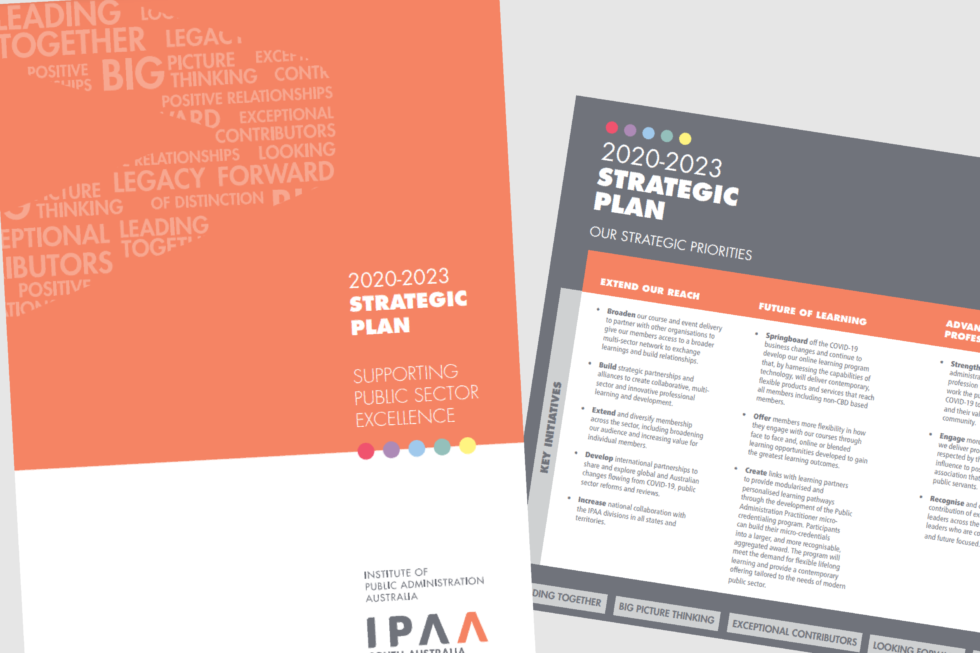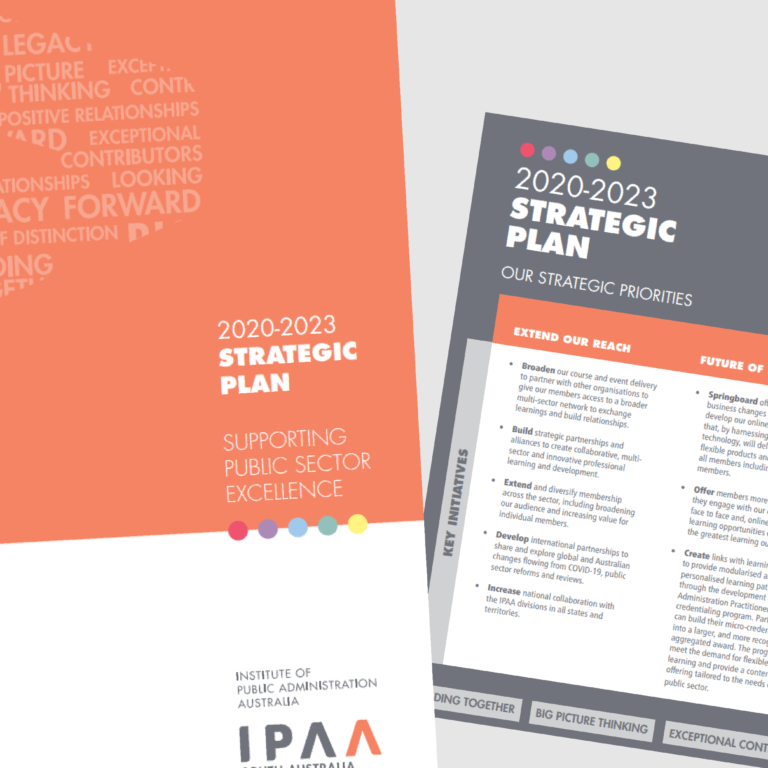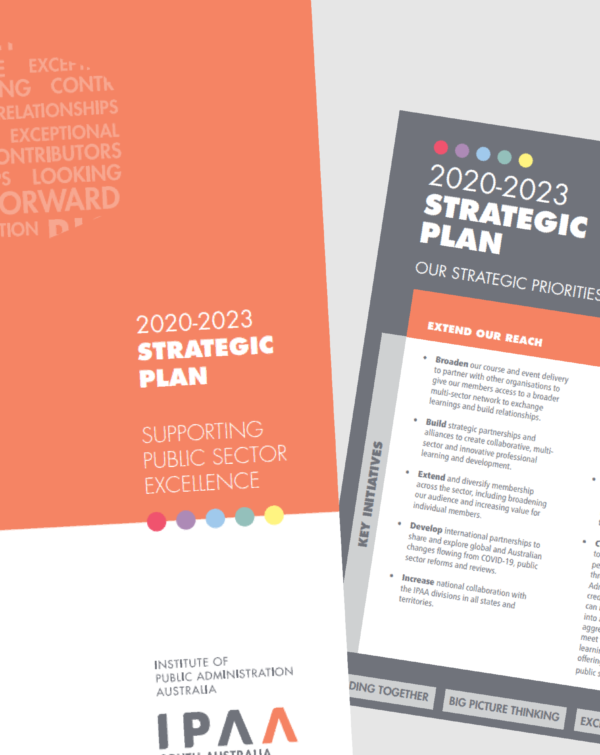Developing Your Editing Skills
Editing is more than fixing errors — it’s about shaping clear, purposeful writing and confidently managing feedback.
“There is still uncertainty, but there’s reason to be hopeful, and there are things that are within our control as a community and individuals and steps we can take.” – John Brayley
SA Chief Psychiatrist, Dr John Brayley, Forensic Psychologist, Luke Broomhall and Commissioner for Public Sector Employment, Erma Ranieri sat down virtually with IPAA SA to share some vital tips and advice on caring for your mental health and wellbeing in the wake of the pandemic.
The mental health ‘shadow pandemic’ has seen many of us and our loved ones dealing with increased stress. As a result of prolonged stress without relief, we are also now seeing anxiety and depression on the rise in our communities.
Below we summarise the key pieces of advice from this interview and the things you can do to manage stress and its effects.
It’s hard to be self-aware while we are experiencing stress. Sit down once-a-week to see how you are tracking and take stock of your mental health and priorities. Have a look at deadlines, commitments and goals and self-assess your stress levels. If you are struggling, set some strategies for “not how you normally function, but how you are functioning right now”. This may mean taking more time for yourself that week or moving some competing commitments around.
Learn how to say no or negotiate on additional commitments. If you take on more than you can handle, you are more likely to encounter stress and ‘burnout’. For example, if you are asked at work to take on an additional task, be realistic in setting expectations for its completion. If you are hesitant on how to respond to deadlines you can’t meet, you can reply with a friendly “I’d love to be able to that, I think I will be able to do that- but in the week afterwards, rather than in the next week”. If you are reasonable and polite you will be able to reach an understanding regarding deadlines and expectations.
After times of prolonged stress, we can feel fatigued and ‘burnt-out’. If you are feeling this way, or ideally before you get to this stage, you should seek some time to rest and recuperate. This could be in the form of a short holiday or a few days of relaxation at home. While we are so busy planning for work and life commitments, it’s important to consider where you are planning time for yourself, and the things that help you unwind.
Social isolation is a big source of stress for many of us still, as we are isolated from friends and family interstate or internationally. For those of us still working from home either full-time, part-time or in a flexible arrangement, we must also have an awareness of how this dynamic affects us mentally. If you are someone who thrives on face-to-face social interaction, it’s important to raise this with your team or manager and to look for opportunities to connect and communicate.
In the context of COVID-19 resilience is much more than ‘bouncing back after adversity’, it’s the management of continued adversity. Self-awareness is again a big help here, where this awareness will help you recognise the warning signs in yourself, your teammates and loved ones if they are not coping well.
What you can do to improve your resilience:
– Get the recommended amount of sleep (see tip 11).
– Follow a healthy diet.
– Take time for exercise and physical activity.
It’s important to hold a personal sense of achievement on a day-to-day basis. This can help promote increased self-awareness, that you still have control over your environment, even through crisis. In a time where we struggle with a seeming loss of control, taking the time to set small and achievable goals each day or week will help to boost your mood.
With screen use at an all-time high, it’s more vital than ever to give yourself a break from digital devices. Set aside some ‘green time’ each day, to be outside and away from the constant influx of information.
Without doubt, 2020 has been a tough year, and for many of us it can feel like one challenge after another. We have all encountered adversity this year and it’s important to be kind to yourself if you have found yourself struggling. Anxiety and burnout are natural responses to prolonged stress and cumulative trauma, so don’t be afraid to seek help when you need it and take time for self-care.
Through all the stories of hardship and trauma, COVID-19 has also brought us some positives. We can be positive in the enviable position of South Australia and Australia compared to other countries around the world in their response. The pandemic has also been an unparalleled demonstration of the joint sense of purpose and community in the SA public sector, and is an experience that you can draw on for the rest of your career.
Amid adversity it’s important to focus on the ‘light at the end of the tunnel’. Being able to stay optimistic will help boost your resilience, particularly through times of prolonged stress. If you are struggling to stay optimistic you can use the simple statement of “All this is going on, it’s very overwhelming and seems negative…but I am still looking forward to [X],[Y],[Z} and things will get better”.
Sleep is one of our most basic needs and sleep deprivation has a major impact on our ability to function on all levels. In the workplace, this can mean a host of negative side effects such as impaired concentration, memory, and coordination. As a basis for self-care, look after your sleep and seek strategies to help improve this if you are struggling.
Its 100% normal to experience anxiety in response to stressors – what is important though is the way you respond to these feelings. A certain degree of stress is in fact healthy and can improve performance. However, If anxiety is occurring and impeding what you need to do seek help early on, to learn the strategies that will work for you and bring anxiety back to a manageable level. It can be helpful to familiarise yourself with the symptoms of anxiety, so you can identify these issues more easily in yourself and others. The Anxiety Checklist provided by BeyondBlue can help you self-assess if you may be struggling with anxiety symptoms.
We are in unprecedented times. Which means the sheer number or degree of stressors we face may simply overwhelm our normal coping responses. This is normal – and is certainly not a sign of ‘weakness’. If you are experiencing regular (for more than a week) symptoms related to irritability, sleep loss, poor appetite, concentration and memory difficulties, there are supports you can speak with confidentially. Your organization has an Employee Assistance Program which is confidential. Alternatively, you can nominate a Psychologist you would like to see. You can contact your General Practitioner for confidential advice and sites such as Beyond Blue provide excellent resources for understanding just how normal your experience can be and what help is available.
Remember, what you are going through now may not be ‘normal’ for you, but it is quite normal for people to go through. Be kind and patient with yourself and seek assistance early.
What can I do if I feel anxiety has spun out of my control?



Even in the midst of these challenging times, it’s vital to keep looking forward. IPAA SA is dedicated to supporting you in your work in the South Australian public sector, which is why the IPAA SA Team and Divisional Council are proud to present our Strategic Plan for 2020-23.
Over the next two years IPAA SA will continue in our ongoing aim of ‘supporting the public sector’, and through consultation with our members, we have identified 4 key areas that we will grow in. These four areas, include a strong focus on learning from the challenges of 2019 and 2020, from the bushfires that ravaged our state, to the ongoing COVID-19 pandemic. We are privileged to be working with a public sector that has risen, above and beyond in meeting these challenges, and with the future insight, we hope to leverage these opportunities to support the public sector in whatever new challenges may emerge.
As we exist solely for our members and to best serve the needs of the public sector your input is essential in implementing our Strategic Plan. We hope that you will contribute by sharing your input in a short survey.



Explore in-depth the tools and strategies you can use to transform your communications in government to have maximum engagement and impact. Whether you communicate internally or externally, this course will help save time and stress in producing content that will get you the greatest returns.



David was one of the best presenters I have had the pleasure of learning from - his content was relevant, he was adaptable to the needs of the room and presented in a way that made it easy to understand and learn from AND relate it back to my needs/role
Lauren
SA Health
(previously Navigating AI in Government Communications)
AI is impacting Government communication – through the introduction of Microsoft Co-Pilot, but also changing the community. From the trust levels of your stakeholders to the way the community uses AI to communicate with you, navigating AI in your department or agency is more than “we have Co-Pilot.”